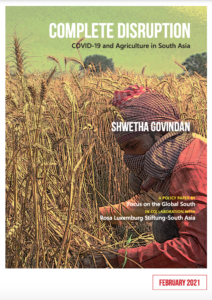12/03/2021
Under: COVID-19 Updates, Food Sovereignty and Agroecology, India, Publications, Reports
Drawing from interviews with peasant movement leaders in the South Asian region and a desk analysis of literature, this report provides a detailed summary of the unfolding reality of the COVID-19 pandemic and its impact on food and agriculture.
Two sets of observations emerge. One, the economic fallout of the pandemic has ostensibly reinforced the entry of corporate-backed food supply chains and market-led interventions in agriculture. Two, governments need to pay more attention to agriculture and its myriad issues, some of which are within the national realm and others that require a regional approach in sharing resources, knowledge and support among countries.




![[IN PHOTOS] In Defense of Human Rights and Dignity Movement (iDEFEND) Mobilization on the fourth State of the Nation Address (SONA) of Ferdinand Marcos, Jr.](https://focusweb.org/wp-content/uploads/2025/07/1-150x150.jpg)

